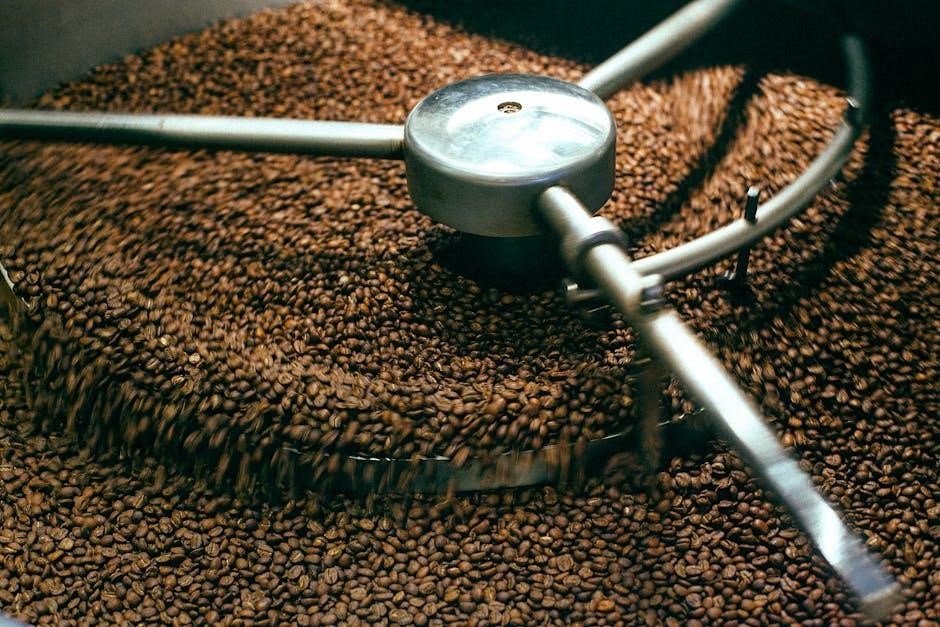Explore the world of coffee with automatic and manual machines, each offering unique benefits. Automatic machines provide convenience and consistency, while manual ones offer control and portability, catering to different lifestyles and preferences.
1.1. Overview of Coffee Machine Types
Coffee machines are broadly categorized into automatic and manual types. Automatic machines automate grinding, brewing, and temperature control, offering convenience for users. Manual machines, like pour-over, French press, or espresso makers, require hands-on operation, allowing for greater control. Both types cater to different preferences, with automatic machines suiting busy lifestyles and manual ones appealing to coffee enthusiasts seeking customization. Understanding these categories helps users choose the right machine based on their needs and coffee-making habits.
1.2. Importance of Choosing the Right Coffee Machine
Selecting the right coffee machine is crucial for enhancing your coffee experience. Automatic machines ensure consistency and save time, ideal for busy individuals. Manual machines offer customization and cost-effectiveness, appealing to coffee purists. The choice impacts daily convenience, flavor quality, and long-term satisfaction. By aligning the machine type with your lifestyle and preferences, you maximize enjoyment and value, ensuring every cup meets your expectations for aroma, taste, and texture, whether at home or in a professional setting.
Key Features of Automatic Coffee Machines
Automatic coffee machines offer advanced features like built-in grinders, customizable brewing settings, and preset options, ensuring convenience, consistency, and a perfect cup with minimal effort required.
2.1. Automation and Convenience
Automatic coffee machines excel in automation, allowing users to brew coffee with the touch of a button. They streamline the process, from grinding to serving, minimizing manual intervention. This convenience is ideal for busy individuals seeking efficiency without compromising on quality. Features like programmable timers and one-touch controls further enhance the user experience, making them a preferred choice for those valuing time and simplicity in their daily routines.
2.2. Built-In Grinding and Brewing Technology
Automatic coffee machines often feature built-in grinders, ensuring freshly ground beans for each brew. This integrated technology optimizes flavor and aroma, eliminating the need for manual grinding. Advanced models may include adjustable grind settings and automatic tampering, streamlining the brewing process. Such innovations enhance consistency and save time, making them ideal for coffee lovers who value both convenience and high-quality results in every cup.
2.3. Customizable Settings and Preset Options
Automatic coffee machines offer extensive customization, allowing users to tailor strength, temperature, and cup size. Many models include preset options for popular brews like espresso, cappuccino, and latte. Advanced machines feature memory settings, enabling users to save their preferences. Some even integrate with smartphone apps for remote control. These features empower users to enjoy their ideal coffee without compromising on convenience, making automatic machines a versatile choice for diverse tastes and preferences.
Key Features of Manual Coffee Machines
Manual coffee machines emphasize simplicity, portability, and affordability. They rely on manual operation, offering direct control over brewing parameters. Ideal for coffee enthusiasts seeking a hands-on experience.
3.1. Manual Operation and Control
Manual coffee machines require hands-on operation, allowing users to precisely control brewing parameters like temperature, water quantity, and extraction time. This hands-on approach appeals to coffee enthusiasts who value the ritual and ability to tailor each brew. Manual machines often lack automation, making them more affordable and portable. They rely on the user’s skill and effort, offering a personal touch that many find rewarding. This method ensures a direct connection to the coffee-making process, fostering a deeper appreciation for the craft.
3.2. Portability and Simplicity
Manual coffee machines are lightweight, compact, and often cordless, making them highly portable. Their simple design requires minimal setup and no complex machinery, offering ease of use. These machines are ideal for travel or small spaces, as they don’t rely on electricity. The straightforward process of manual brewing appeals to those who prefer a no-frills, easy-to-clean option. This simplicity makes manual machines a practical choice for everyday use or on-the-go brewing, ensuring a hassle-free coffee experience anywhere.
3.3. Cost-Effectiveness
Manual coffee machines are generally more affordable than automatic ones, offering a budget-friendly option for coffee enthusiasts. They often require a one-time purchase with no ongoing costs for pods or capsules. This makes them a cost-effective choice for those who want to enjoy high-quality coffee without a significant investment. Additionally, manual machines usually have lower maintenance costs, as they have fewer components that might need repair or replacement over time. This affordability makes them a popular choice for many coffee lovers.
Pros and Cons of Automatic Coffee Machines
Automatic coffee machines offer unmatched convenience and consistency but come with higher costs and maintenance demands, making them a trade-off between ease and expense.
4.1. Advantages: Speed, Ease of Use, and Consistency
Automatic coffee machines excel in speed, delivering quick brews with minimal effort. They are incredibly easy to use, requiring only the press of a button. Their advanced technology ensures consistent flavor, perfect for those seeking reliability. These machines are ideal for busy individuals who value time and convenience, providing a seamless coffee-making experience without compromising on taste or quality.
4.2. Disadvantages: Higher Cost and Maintenance
Automatic coffee machines are typically more expensive than manual ones, with prices ranging from a few hundred to several thousand dollars. Additionally, they require regular maintenance, including descaling and cleaning to prevent mineral buildup and bacterial growth. These costs and upkeep can be a drawback for those on a budget or seeking a low-maintenance option, making manual machines a more appealing choice for some coffee enthusiasts.
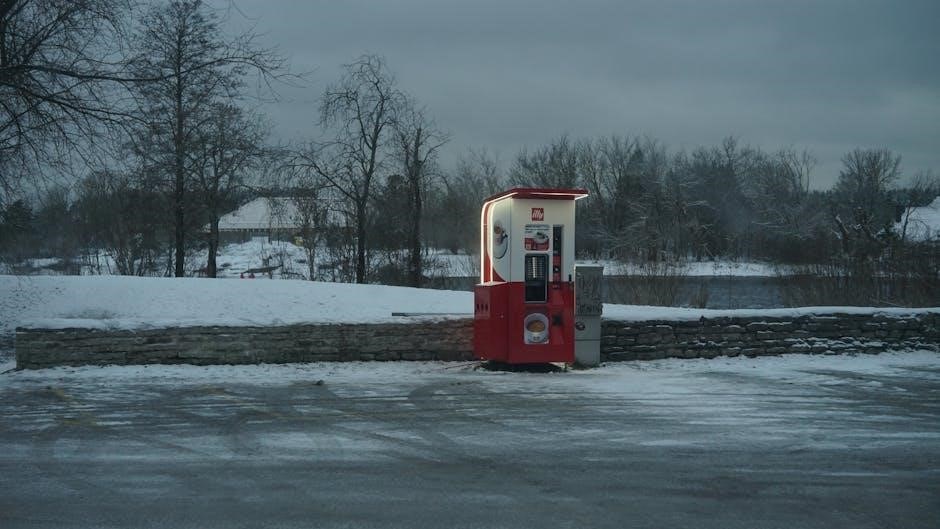
Pros and Cons of Manual Coffee Machines
Manual coffee machines are affordable, portable, and offer customization. However, they require time, effort, and skill, making them less convenient for those seeking simplicity and speed.
5.1. Advantages: Affordability and Portability
Manual coffee machines are budget-friendly and lightweight, making them ideal for travel or small spaces; Their simplicity often means lower purchase costs and fewer maintenance expenses, appealing to casual users who value portability and affordability without compromising on flavor quality. This accessibility makes manual machines a popular choice for those seeking a cost-effective, easy-to-carry brewing solution.
5.2. Disadvantages: Time-Consuming and Skill-Dependent
Manual coffee machines require time and effort, as each brew involves grinding beans, heating water, and carefully pouring to achieve the perfect cup. They also demand a certain level of skill, as factors like water temperature and extraction time must be manually controlled. This can be daunting for beginners and may not suit those seeking a quick, hassle-free brewing experience. The learning curve and manual labor involved can be significant drawbacks for some users.
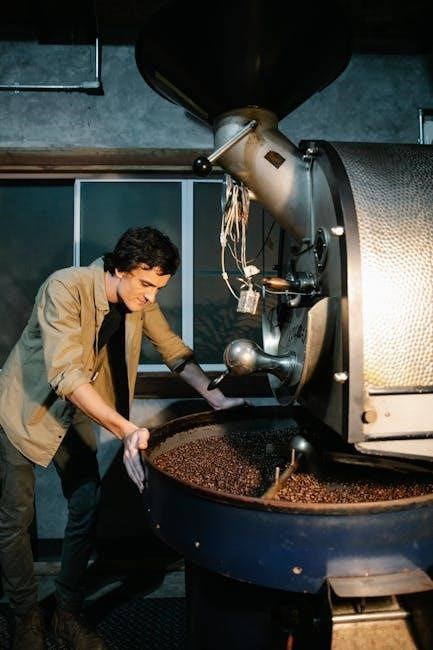
Cost Comparison: Automatic vs. Manual
Automatic coffee machines are generally more expensive due to advanced features, while manual machines are affordable and budget-friendly, offering a cost-effective option for coffee enthusiasts.
6.1. Price Range of Automatic Machines
Automatic coffee machines vary widely in price, ranging from affordable entry-level models under $200 to high-end, feature-rich machines exceeding $2,000. Mid-range options typically fall between $500 to $1,500, offering a balance of quality and functionality. Premium brands and advanced features like built-in grinders and customizable settings drive the higher costs, making these machines a significant investment for coffee lovers seeking convenience and superior brewing quality.
6.2. Price Range of Manual Machines
Manual coffee machines are generally more affordable, with options starting as low as $20 for basic devices like pour-over drippers or French presses. Mid-range manual machines, such as manual espresso brewers, typically cost between $50 to $200. High-end manual machines, including precision brewers or specialty equipment, can range from $200 to $500. These machines are cost-effective, offering excellent value for those who enjoy hands-on brewing without the need for advanced automation or expensive features.
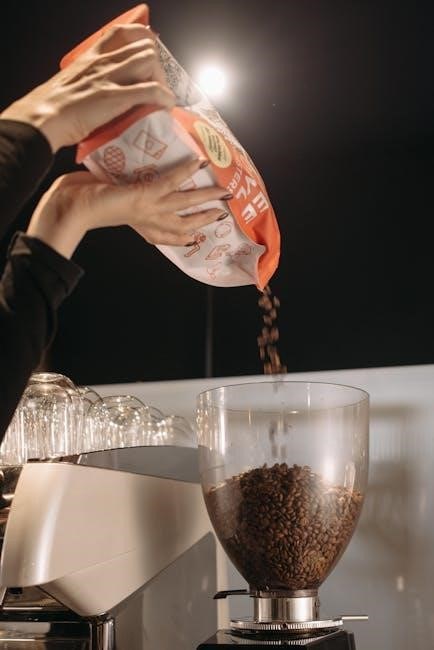
Maintenance and Upkeep
Automatic machines require regular descaling and cleaning to maintain performance, while manual machines need less upkeep but still demand proper rinsing and care for optimal function.
7.1. Cleaning and Descaling Requirements for Automatic Machines
Regular cleaning and descaling are crucial for automatic coffee machines to maintain performance and prevent mineral buildup. Empty drip trays and clean brew heads daily. Descaling every 1-3 months, depending on water hardness, ensures optimal functionality. Vinegar is often used but may cause corrosion, so water-vinegar mixtures or descaling solutions are recommended. Proper maintenance extends machine lifespan and ensures consistent coffee quality.
7.2. Maintenance Needs for Manual Machines
Manual coffee machines require less maintenance compared to automatic ones. Regular rinsing and cleaning of components like filters and chambers are essential. Descale periodically if using hard water, but frequency is lower. Parts are easily replaceable, and manual machines are less prone to scaling issues. Simple upkeep ensures longevity and consistent brewing. Portability and lack of complex mechanisms make manual machines low-fuss, ideal for those who prefer simplicity and ease of maintenance without advanced technical knowledge or specialized tools.
User Experience and Satisfaction
Automatic machines deliver convenience and speed, appealing to those seeking hassle-free brewing. Manual machines offer a hands-on, customizable experience, satisfying coffee enthusiasts who value control and craftsmanship.
8.1.Ease of Use and Convenience
8.1. Ease of Use and Convenience
Automatic coffee machines excel in ease of use, offering one-touch operation and preset settings. They are ideal for busy individuals who value speed and convenience. Manual machines, while requiring more effort, provide a sense of accomplishment and control. For those who enjoy a hands-on process, manual brewing can be meditative. Ultimately, the choice depends on whether convenience or personal involvement is prioritized in the daily coffee ritual.
8.2. Customization and Control Options
Manual coffee machines offer extensive customization, allowing users to tailor brewing parameters like water temperature, coffee-to-water ratio, and steeping time. Automatic machines, while convenient, often have limited manual adjustments but provide preset options for consistency. For coffee enthusiasts seeking precision, manual machines enable a personalized brewing experience, whereas automatic machines cater to those preferring simplicity and efficiency without compromising on flavor quality.
Brewing Quality and Flavor
Automatic machines deliver consistent flavor with advanced temperature control and precise water distribution. Manual machines allow for personalized brewing, enabling a richer, more customizable coffee experience.
9.1. Consistency of Automatic Machines
Automatic coffee machines excel in delivering consistent flavor due to their advanced temperature control and precise water distribution. They minimize human error, ensuring each brew is uniform and reliable. With built-in grinders and automated brewing cycles, these machines maintain optimal extraction levels, resulting in a perfect cup every time. This consistency is particularly appealing for those who value reliability and uniformity in their daily coffee ritual without compromising on taste or quality.
9;2. Customization Potential of Manual Machines
Manual coffee machines offer unparalleled customization, allowing users to tailor every aspect of their brew. From grind size to water temperature and steeping time, each variable can be adjusted to suit personal taste preferences. This level of control attracts coffee enthusiasts who enjoy experimenting and refining their brewing techniques. While requiring more skill and effort, manual machines empower users to craft truly unique and personalized coffee experiences, making them ideal for those who value creativity and precision in their coffee-making process.
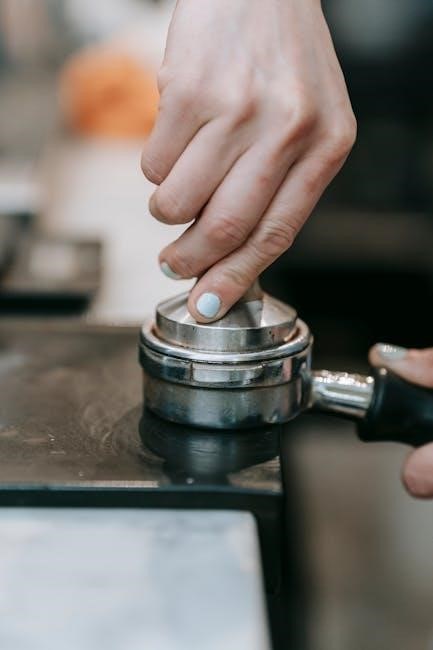
Popular Models and Brands
Discover top automatic and manual coffee machines from renowned brands like Breville, De’Longhi, and Nespresso. These brands offer innovative designs and exceptional performance, meeting diverse coffee needs and preferences efficiently.
10.1. Top Automatic Coffee Machine Models
Top automatic coffee machines include Breville Oracle Touch, De’Longhi Magnifica, and Siemens EQ models. These machines offer advanced features like automatic grinders, customizable settings, and app control. Breville’s Oracle Touch is renowned for its user-friendly interface and precise temperature control. De’Longhi’s Magnifica features a built-in grinder and compact design, ideal for home use. Siemens EQ models boast smart technology and silent operation, while Jura E8 offers a sleek design and large color display. These models are popular among coffee enthusiasts for their convenience and quality.
10.2. Recommended Manual Coffee Machine Models
Popular manual coffee machines include the Aeropress, French press, and pour-over brewers. The Aeropress is praised for its versatility and smooth coffee. French press machines, like Bodum Chambord, offer rich, bold flavors. Pour-over options, such as Hario V60, provide precise control. Additionally, manual espresso machines like Flair Espresso Maker and manual drip brewers are favored for their portability and simplicity. These models are ideal for those seeking affordable, customizable, and high-quality brewing experiences without automation.
